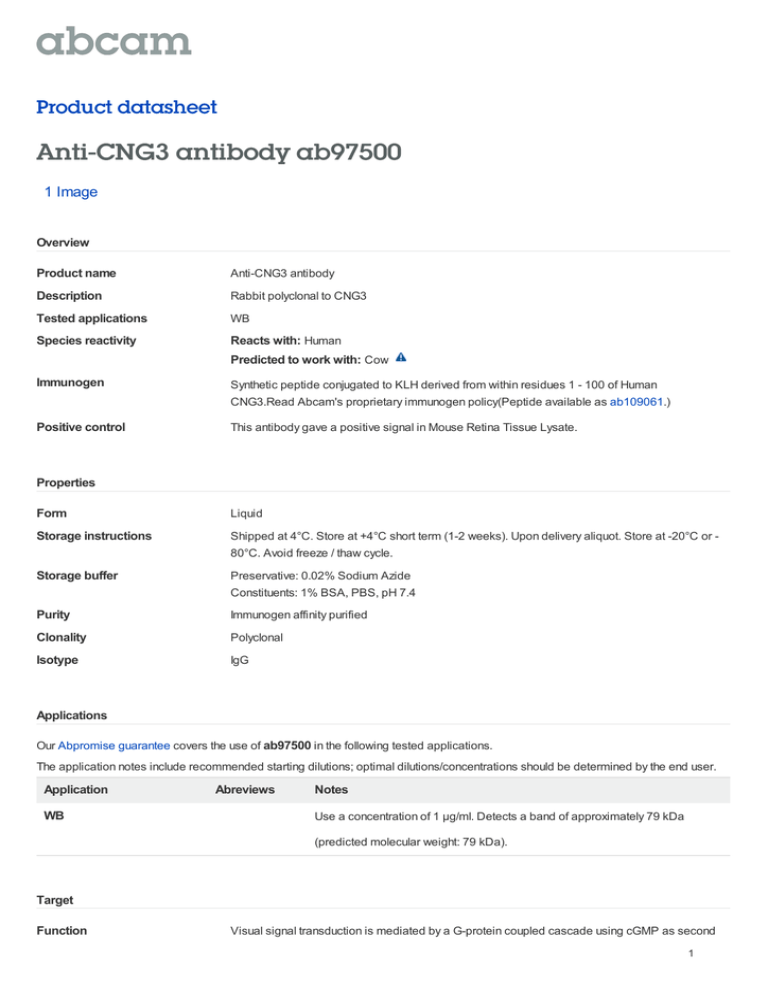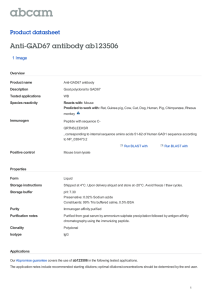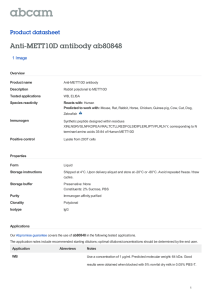Anti-CNG3 antibody ab97500 Product datasheet 1 Image
advertisement

Product datasheet Anti-CNG3 antibody ab97500 1 Image Overview Product name Anti-CNG3 antibody Description Rabbit polyclonal to CNG3 Tested applications WB Species reactivity Reacts with: Human Predicted to work with: Cow Immunogen Synthetic peptide conjugated to KLH derived from within residues 1 - 100 of Human CNG3.Read Abcam's proprietary immunogen policy(Peptide available as ab109061.) Positive control This antibody gave a positive signal in Mouse Retina Tissue Lysate. Properties Form Liquid Storage instructions Shipped at 4°C. Store at +4°C short term (1-2 weeks). Upon delivery aliquot. Store at -20°C or 80°C. Avoid freeze / thaw cycle. Storage buffer Preservative: 0.02% Sodium Azide Constituents: 1% BSA, PBS, pH 7.4 Purity Immunogen affinity purified Clonality Polyclonal Isotype IgG Applications Our Abpromise guarantee covers the use of ab97500 in the following tested applications. The application notes include recommended starting dilutions; optimal dilutions/concentrations should be determined by the end user. Application WB Abreviews Notes Use a concentration of 1 µg/ml. Detects a band of approximately 79 kDa (predicted molecular weight: 79 kDa). Target Function Visual signal transduction is mediated by a G-protein coupled cascade using cGMP as second 1 messenger. This protein can be activated by cyclic GMP which leads to an opening of the cation channel and thereby causing a depolarization of cone photoreceptors. Induced a flickering channel gating, weakened the outward rectification in the presence of extracellular calcium, increased sensitivity for L-cis diltiazem and enhanced the cAMP efficacy of the channel when coexpressed with CNGB3 (By similarity). Essential for the generation of light-evoked electrical responses in the red-, green- and blue sensitive cones. Tissue specificity Prominently expressed in retina. Involvement in disease Defects in CNGA3 are the cause of achromatopsia type 2 (ACHM2) [MIM:216900]; also known as total colorblindness or rod monochromacy (RMCH2). ACHM2 is an autosomal recessive condition characterized by day blindness and photophobia. In ACHM2 patients the cones are defective and the subjects see better at night. Sequence similarities Belongs to the cyclic nucleotide-gated cation channel (TC 1.A.1.5) family. CNGA3 subfamily. Contains 1 cyclic nucleotide-binding domain. Cellular localization Membrane. Anti-CNG3 antibody images Anti-CNG3 antibody (ab97500) at 1 µg/ml + Mouse Retina Tissue Lysate at 10 µg Secondary Goat Anti-Rabbit IgG H&L (HRP) preadsorbed (ab97080) at 1/5000 dilution developed using the ECL technique Performed under reducing conditions. Predicted band size : 79 kDa Western blot - CNG3 antibody (ab97500) Observed band size : 79 kDa Additional bands at : 46 kDa,55 kDa,70 kDa. We are unsure as to the identity of these extra bands. Exposure time : 2 minutes Please note: All products are "FOR RESEARCH USE ONLY AND ARE NOT INTENDED FOR DIAGNOSTIC OR THERAPEUTIC USE" Our Abpromise to you: Quality guaranteed and expert technical support Replacement or refund for products not performing as stated on the datasheet Valid for 12 months from date of delivery Response to your inquiry within 24 hours We provide support in Chinese, English, French, German, Japanese and Spanish Extensive multi-media technical resources to help you We investigate all quality concerns to ensure our products perform to the highest standards If the product does not perform as described on this datasheet, we will offer a refund or replacement. For full details of the Abpromise, please visit http://www.abcam.com/abpromise or contact our technical team. 2 Terms and conditions Guarantee only valid for products bought direct from Abcam or one of our authorized distributors 3

